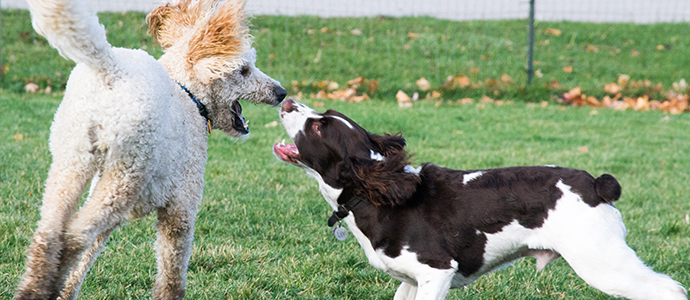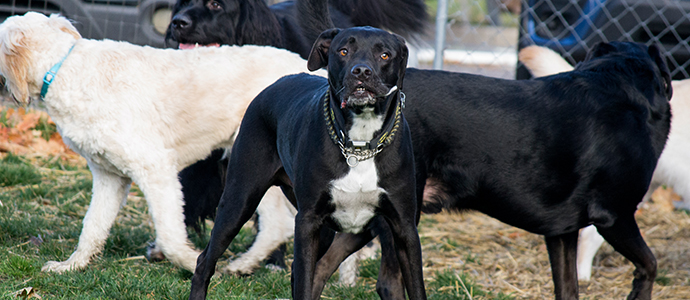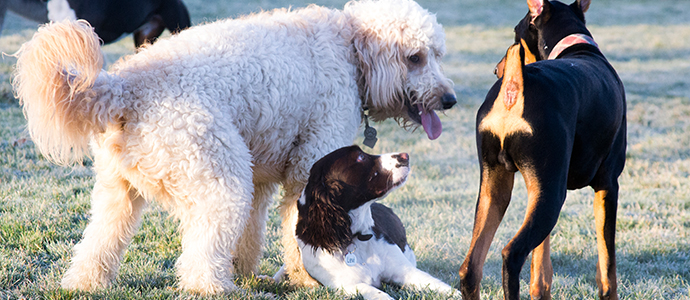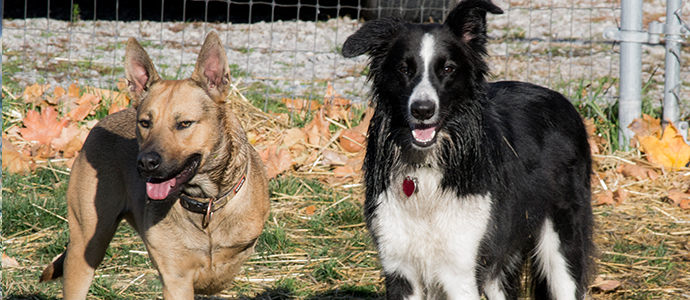

What We Require and Why
Prior to joining one of our training programs, all dogs need to provide proof of certain vaccinations and parasite preventatives. This is one way we work to keep our students as healthy as possible, but occasionally owners have questions as to why their individual dog needs all these different medications or procedures. Here's a detailed explanation behind our decisions:

Vaccines
The vaccinations we require prior to attendance are:
- Distemper/Parvo
- Rabies
- Bordetella
- Influenza
- Leptospirosis
- Lyme
- Canine Coronavirus
Distemper
The Distemper vaccine is a combo vaccine that often appears on your vet records as DHPP, DHLPP, DA2PP, DA2PPL, or some similar combination of letters. This vaccine is one of the two "core" vaccines your vet gives on a regular basis. It protects against multiple contagious (and sometimes deadly) diseases including some of the viruses that cause "Kennel Cough", Distemper, Parvo, and sometimes Leptospirosis (depending on which version of the combo your vet gives). All of these diseases are highly contagious and very dangerous; for this reason, we require all puppies to have at least the second series of this vaccine before coming to class or daycare.
For more info on this particular combo and what it covers, Click Here.
Rabies
Rabies is a vaccine we aren't super concerned about. While it is important and required by the state of Michigan, we don't generally have drooling racoons, bats, or groundhogs attending our obedience classes. For this reason, puppies are allowed to start class even if they have not yet had the Rabies shot (though they do need to get it when old enough, by law).
You can find more information on Rabies and its transmission on the CDC site, Here.
Bordetella
Sometimes referred to as the "Kennel Cough" Vaccine, the Bordetella shot is actually one of three vaccines that targets this Common Cold of the doggy world (the other two, Adenovirus and Parainfluenza, are part of your Distemper Combo). However, "Kennel Cough" is not an actual disease/illness; it's a general purpose term that is frequently used to describe any respiratory infection by a number of viruses and bacteria, including Bordetella, Adenovirus, Parainfluenza, Mycoplasma, Respiratory Coronavirus, Distemper, and more. Because it can be caused by multiple factors, and not all of them have available vaccines, shots do not always prevent Kennel Cough. However, vaccinating for the most common causes (like Bordetella) can help reduce the risk when your dog visits a place that has a high concentration of other pups. Depending on your vet and the type of vaccine used, this may be either a one or two-part series. Dogs need to have at least the first shot one week prior to attending training, and follow up with the booster (if required) later.
You can find more information on the Bordetella vaccine and Kennel Cough in this excellent AKC article, Here.
Influenza
The Canine Influenza vaccine is a relatively new requirement for Kaybee's. In the summer of 2018, it became a small epidemic in our state, and did eventually work its way far enough north to become an established concern in our area. Canine Influenza is extremely contagious (as in, if your unvaccinated dog comes in contact with the virus, they will get it 100% of the time!) and can live on surfaces for up to 48 hours. Untreated, it can also be potentially fatal. Luckily, this one we have a very effective vaccine for; a vaccinated dog has less than 10% chance of contracting the virus if exposed, and of the 10% that do get it, the illness is much less severe. The Influenza vaccine is a 2-part series, and dogs must have at least the first shot before starting training with us (they still need the booster as well once applicable).
For more information on Canine Influenza, Click Here.
Lepto, Lyme, and Corona
These three vaccines are all good to have, and we don't discourage them by any means. However, in terms of importance as far as daycare is concerned, they're relatively small threats.
Leptospirosis is a serious and contagious disease spread through the urine of infected animals, and if your dog can get the vaccine, they definitely should. However, there has been some evidence that certain dog breeds experience more adverse reactions to the Lepto shot than others, making it inadvisable for certain dogs to receive the vaccine. Reactions are still very rare over all, so always consult your vet to determine your dog's best option. Because we don't want to force a dog to take something that could make it very sick, this vaccine falls in the "strongly recommended, but not required" category.
Lyme Disease is a serious disease spread by certain species of ticks. However, ticks are not a swarming insect (meaning, if one dog comes in with a tick, we don't need to treat the entire building to protect the others like with fleas) and Lyme Disease isn't airborne or spread through water. So if your vet recommends your dog get this one, by all means, do! But your pup isn't going to get Lyme Disease by coming to daycare, regardless.
Canine Intestinal Coronavirus is simply not a prevalent problem in our area, currently. Several local vets don't even keep it on hand. If there were a vaccine for the Canine Respiratory Coronavirus, which is one cause of Kennel Cough, we'd be all over it, but unfortunately that vaccine does not exist to our knowledge. (It should be noted, as this page was updated in 2020 and the world is currently upside down over it, that the various types of Canine Coronavirus are not the same as the "Novel Coronavirus", Covid-19.) There's nothing wrong with getting this shot just in case, if your vet recommends it. As with all bad things, it's entirely possible that we may need to worry about it in the future, but for now the Canine Corona vaccine isn't super important.

Parasite Preventatives
The options for preventatives are extremely diverse, so rather than say which medication you need, we'll just say which parasites we are most concerned about:
- Fleas
- Heartworm
- Roundworm
- Hookworm
- Whipworm
Some of the ones that do include:
- Ticks
- Flies
- Tapeworm
- Mites
- Mosquitos
- Lice
Some of the ones that have no medical preventative are:
- Coccidia
- Giardia
If you aren't sure what your preventatives cover, check out this handy table we made explaining some of the most common medications on the market. Always consult your vet when choosing preventatives; some breeds/types of dogs are known to have bad reactions to certain medications. The AKC has an excellent article that covers most of the parasites we listed, which you can read here.
Things to note when using topical or collar-type preventatives -
Dogs have a tendancy to pull on collars/neck scruff/ears/etc when playing, so there is a chance that expensive flea collar may end up ripped off or damaged during daycare. It may be in your best interest to take the collar off when dropping off, and put it back on when picking up. Similarly, if using a topical preventative, make sure there is no residue still on your pup's shoulders when dropping them off to play. We don't want anybody getting it in their mouth by accident.
High Priority Concerns
These are the parasites that have the potential to spread quickly and do the most damage if someone accidentally brings them into the facility.
Fleas are the nuisance everyone knows about. Once you get them, it's a massive struggle to get rid of them. They can cause allergic reactions, itching, hot spots, tapeworm, and spread diseases (including the Black Plague!). Thankfully, due to diligent use of preventatives by our patrons, Kaybee's has never had a flea infestation... and we don't plan to have one in the future! So make sure to stay up-to-date on your pet's flea killers.
Find out more information about fleas here or here.
Heartworm This deadly parasite is spread by mosquitoes, and proliferates in your dog's heart, lungs, liver and kidneys until the organs look like a grotesque mass of spaghetti. Once infected, it is a long and difficult process to get rid of the nasty noodle monsters, and the treatment itself can sometimes be deadly. A Heartworm positive dog, even if it's undergoing treatment, would be negatively impacted by playing at daycare all day, so keeping up on prevention and testing prior to attending school is very important.
See what the FDA says about heartworms here.
Roundworms are extremeley contagious, and can be spread just by sniffing infected stool. They grow in the intestines and feed off partially digested food, interfering with the host's nutrient absorbtion. Roundworms are especially common in puppies, who contract them from their mother. One species is even transferable to humans. You can often tell a wormy puppy by their distended belly, or by identifyling spaghetti-like worms in their stool.
Find out more about roundworm here.
Hookworms are even more contagious than roundworms, and can be a problem if you live in an apartment complex or use another type of communal doggie potty area. When an infected dog relieves itself, it deposits worm eggs in the grass. Even after the stool has been removed, any dog (or in the case of one hookworm species, any human, too) that has direct skin contact with the soil runs a risk of hookworm larva BURROWING THROUGH THEIR SKIN. (Can you say EWW?!) In addition, hookworms can be spread from mother to puppy, by eating or sniffing infected stool, or by eating another animal (like rodents or birds). There are multiple species of hookworm, and not all preventatives cover all species. Incidentally, the one preventative we aren't super fond of, Ivermectin (Heartgard), is one of the best at preventing multiple types of hookworm. If you choose to use this particular preventative, make sure to get at least 2 fecal tests done each year, because although it may do well with hookworm, it doesn't cover whipworm.
For more information on these slimy little nightmares, click here.
Whipworms are intestinal bloodsuckers that burrow into the lining of the small intestine. Like roundworms and hookworms, they are spread through feces, but can live much longer outside than the other two (up to 3 years!) and can exist in contaminated food, water, soil, or the flesh of other animals (like rodents). It's important to note that if your dog is on the popular preventative Heartgard (or any other Ivermectin-based preventative) they are NOT protected from whipworm.
For more information on whipworms, check out this link.
Secondary Concerns
These bugs are still dangerous, but they don't have the same potential for spreading amongst playmates that the "High Priority" parasites do. They can still pose serious health concerns to individual dogs though, so don't disregard them as threats just because we don't require preventatives for them at school.
Ticks are actually one of the most dangerous pests on the list, but as they aren't prone to infestations like fleas, they aren't technically on our "required protection" list. That said, ticks carry many diseases and infections that can be potentially deadly, so some form of tick protection is highly recommended, even if you don't do much hiking in the woods. You can read about several tick-borne diseases, and which types of ticks carry them, here.
Flies are more of a nuisance pest than anything else, and although we do of course get the house fly variety in the summer, we don't typically have issues with the biting variety. Most preventatives don't do anything for flies, but a few do. It's a nice option to have if you live around livestock. There's some nice tips on repelling them in this article.
Tapeworm is actually fairly common, as there are only a few preventatives that cover it. Luckily, it rarely causes any serious health problems, and isn't very contagious due to the worms' lifecycle. Tapeworm infection is caused by ingesting an infected flea; it can not be spread by eating poop (unless there happens to be a flea on the poop), and while having your dog on flea preventatives reduces the likelyhood of ingestion, it doesn't completely remove the possibility. This is particularly true if your dog is a "critter catcher" and kills, eats, or chews on small animals like rodents or birds, which frequently harbor fleas. To make things just a little more complicated, fecal tests frequently miss tapeworms, so it's up to you to keep an eye on your dog's stools to watch for any rice-like segments they may pass. If you do see worm segments in their stool, you can easily solve the problem with an over-the-counter dewormer, or by switching preventatives to one that covers tapeworm.
For more info on this wiggly white nuisance, click here.
Mites/Mange There are multiple types of mites. Some of them, such as those causing Sarcoptic Mange, are contagious. Others, like Demodectic Mange, are present on all dogs and only a few develop problems with them. Preventatives that cover mites will usually specify which type on the label. Check out this site for a detailed breakdown of the different species of mites and what to watch out for.
Mosquitos probably top the list when it comes to annoying pests for humans, but they can be equally problematic for dogs. Mosquitos carry Heartworm Disease as well as West Nile Virus, which in rare instances can affect dogs and cats as well as horses, birds, and humans. For more information on mosquitos and hearworm disease, click here.
Lice Lice cause similar effects as fleas, but are much less common in temperate climates and are species-specific (meaning Dog Lice are not the same as Human Lice, and won't switch back and forth). A lot of flea preventatives also cover the most common species of lice. For more information, check out this article from the AKC.
Fecal Exams are Still Important
Even if you're on the best prevention money can buy, there are still some things to watch out for. Diarrhea, for example, is one of those things most pet owners don't go running to the vet for. However, persistant or unusual diarrhea could be caused by a highly contagious organism such as those listed below. As a general guideline, if your dog has diarrhea, try skipping just one meal to "reset" their tummy. If that doesn't fix the problem, it might be a good idea to consult your vet, just to be sure. To make things more frustrating, your dog could have either or both of the problems below, with no symptoms at all! This is why we require at least one fecal exam per year.
If you frequent the dog park, hunt with your dog, allow your dog to swim in ponds/lakes, or roam in wooded or swampy areas, your dog is at higher risk of contracting these microscopic parasites. That doesn't mean you shouldn't ever let your dog have a good time being a dog; just know what to watch for, and keep up on regular yearly checkups!
Coccidia is a single celled parasite that infects the small intestine and is spread through excrement. It is very hardy and can live in the environment for up to a year; the only cleaner known to reliably kill it is ammonia. It is most commonly found in puppies, who contract it from their mother. The most common symptom is Diarrhea, but dogs may be carriers of coccidia without any symptoms at all. For a more in-depth look at this annoying pest, click here.
Giardia is very similar to Coccidia in symptoms and mode of transmission, and can also infect dogs without any symptoms. Both diseases can be diagnosed and treated through a fecal exam with your vet. Find more info on Giardia here.

To Fix, or Not To Fix?
This one is a very complicated question, and one with a lot of different opinions. Let's get the easy one out of the way - Kaybee's does not require dogs to be spayed or neutered before or while attending training. HOWEVER, there could be a situation where the trainers recommend sterilization to help with specific behavior problems.
Even then, this decision should always be thoroughly researched and discussed with your veterinarian. There are pros and cons to both options, as well as how soon to do the surgery (if you plan to do it). Intact females need to stay home from daycare for at least 3 weeks after the start of heat, preferably 4 weeks to be very safe. Don't assume that just because she's done bleeding, you're in the clear!
PetMD has an excellent article on the subject you can check out here.

What else should I watch out for?
Dogs and kids are a lot alike in many ways, and just like kids are prone to scrapes and bruises or picking up "The Scuz" from daycare or school, dogs will eventually come down with something inconvenient or unpleasant. We do our best to keep everyone clean, healthy, and safe, but once in a while someone will come in with a cold their human wasn't aware of, find a sharp spot on a fence, or get in an argument with a playmate. Here's a few other health-related things to be aware of if you bring your dog to daycare or group classes:
Diarrhea If a dog comes in with or develops diarrhea during daycare, our standard procedure is to notify mom or dad and put the dog on crate rest with extra potty breaks and plenty of water to prevent dehydration. Exercise stimulates bowl movements, and excessive pottying will deplete the dog of energy and water; this means you don't want the dog playing much if they have "the poops". In the vast majority of cases, diarrhea is just an annoyance and not anything serious or contagious, but please let us know if you ever suspect your dog has something more than a simple tummy ache.
Canine Oral Papilloma Virus (a.k.a. COPV, or "Puppy Warts") is a contagious cosmetic condition spread between young dogs/puppies and those with compromised immune systems. The virus causes colorless, cauliflower-like growths to sprout on or in lips, on gums, around the muzzle or chin, or more rarely on or around the eyelids. While these growths are usually just ugly and eventually clear up on their own, they do usually take a long time to go away and the puppy must avoid other dogs until the bump(s) have completely disappeared. While most puppies only develop one or two bumps, in very rare cases the warts can become prolific and cause pain or problems eating. Although it is not a common occurance, when one puppy brings it in, the long incubation period means that it can take months for us to truly be rid of it. When practicing "physical exam" with your dog, don't forget to check mouths and teeth! Catching it early can help prevent months of headaches and other bumpy puppy lips.
Open Wounds (cuts, broken nails, hot spots, toothmarks, surgical sites, etc)
If your dog has any known booboos, the safest course of action is to keep them out of daycare until mostly or all the way healed to help prevent infection. If they must come to daycare, make sure to point the booboo out to us at drop-off, and if possible have it covered or wrapped to help keep germs off. Broken skin of any type on or near the feet is of special concern, as it requires extra precautions to keep paws away from urine or feces (very hard to do when everyone potties in the same areas!).
Injuries or Allergies
If your dog has any known injuries, allergies, or other existing conditions, please let us know prior to drop off so we can make accommodations.